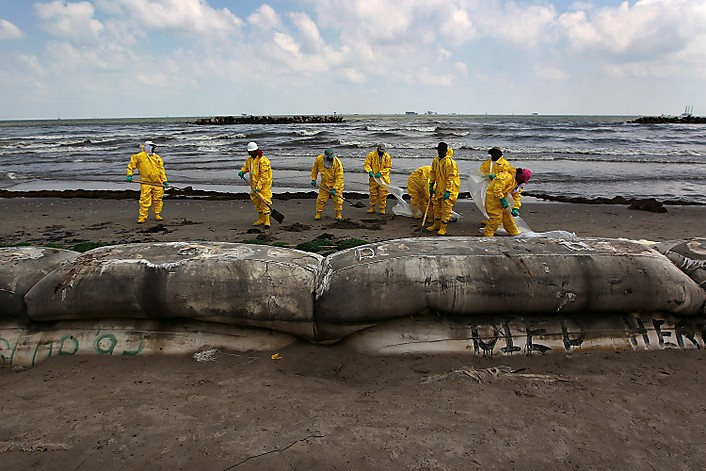BP hires prison labor to clean up spill while coastal residents struggle
By Abe Louise Young
Published on Friday, July 23, 2010
In the first few days after BP’s Deepwater Horizon wellhead exploded, spewing crude oil into the Gulf of Mexico, cleanup workers could be seen on Louisiana beaches wearing scarlet pants and white t-shirts with the words “Inmate Labor” printed in large red block letters. Coastal residents, many of whom had just seen their livelihoods disappear, expressed outrage at community meetings; why should BP be using cheap or free prison labor when so many people were desperate for work? The outfits disappeared overnight. Work crews in Grand Isle, Louisiana, still stand out. In a region where nine out of ten residents are white, the cleanup workers are almost exclusively African-American men. The racialized nature of the cleanup is so conspicuous that Ben Jealous, the president of the NAACP, sent a public letter to BP CEO Tony Hayward on July 9, demanding to know why black people were over-represented in “the most physically difficult, lowest paying jobs, with the most significant exposure to toxins.” Hiring prison labor is more than a way for BP to save money while cleaning up the biggest oil spill in history. By tapping into the inmate workforce, the company and its subcontractors get workers who are not only cheap but easily silenced-and they get lucrative tax write-offs in the process. Known to some as “the inmate state,” Louisiana has the highest rate of incarceration of any other state in the country. Seventy percent of its 39,000 inmates are African-American men. The Louisiana Department of Corrections (DOC) only has beds for half that many prisoners, so 20,000 inmates live in parish jails, privately run contract facilities and for-profit work release centers. Prisons and parish jails provide free daily labor to the state and private companies like BP, while also operating their own factories and farms, where inmates earn between zero and forty cents an hour. Obedient inmates, or “trustees,” become eligible for work release in the last three years of their sentences. This means they can be a part of a market-rate, daily labor force that works for private companies outside the prison gates. The advantage for trustees is that they get to keep a portion of their earnings, redeemable upon release. The advantage for private companies is that trustees are covered under Work Opportunity Tax Credit, a holdover from Bush’s Welfare to Work legislation that rewards private-sector employers for hiring risky “target groups.” Businesses earn a tax credit of $2,400 for every work release inmate they hire. On top of that, they can earn back up to 40 percent of the wages they pay annually to “target group workers.” If BP’s use of prison labor remains an open secret on the Gulf Coast, no one in an official capacity is saying so. At the Grand Isle base camp in early June, I called BP’s Public Information line, and visited representatives for the Coast Guard Public Relations team, the Department of Homeland Security, and the Louisiana Fisheries and Wildlife Department. They were all stumped. Were inmates doing shore protection or oil cleanup work? They had no idea. In fact, they said, they’d like to know-would I call them if I found out? …
BP Hires Prison Labor to Clean Up Spill While Coastal Residents Struggle
